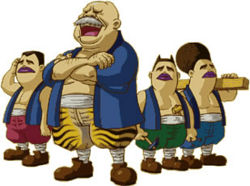Mutoh and the Carpenters

| |
| Mutoh and three of the Carpenters. | |
| Mutoh and the Carpenters | |
| Species | Hylian, Human (varies) |
| Relatives | Anju, Grog (Children in OoT) |
| Debut | The Legend of Zelda: Ocarina of Time |
Mutoh and the Carpenters are a band of workers who act as recurring characters in the Legend of Zelda games that are commonly seen fixing bridges or doing other kinds of construction. They were not named until their second appearance in The Legend of Zelda: Majora's Mask, where their leader was named Mutoh, while his workers were named Ichiro, Jiro, Sabooru and Shiro, although in The Minish Cap they were alternately called Brent, Mack, Bremor, and Doyle
Background[edit]
In Ocarina of Time, Mutoh was the boss of a group of carpenters in Kakariko Village. When Link first encountered them, the carpenters were busy building a new house in the center of town. As for Mutoh, he was commonly found at home, where he often complained of his son Grogm who mostly sulked underneath a tree at night. Seven years later after Ganondorf took over, the carpenters were supposed to work on the bridge to Gerudo Valley, but they decided to abandon their overbearing boss to join the Gerudo thieves. They ended up imprisoned by the Gerudo and had to be rescued by Link. Afterwards they returned to their boss and after being scolded, worked to repair the bridge. During the trading sidequest, Mutoh would be confused if Link returned his Poacher's Saw to him. Unaware of his son's fate, he swore that he left if with his wife. Still, he gave Link the Broken Goron's Sword in exchange and recommended him to a Goron smithy.
In Majora's Mask, the Termina versions of the carpenters were seen in Clock Town preparing for the Festival of Time. Once again, Mutoh was the head carpenter and was resolute on staying in Clock Town, despite the imminent arrival of a plummeting Moon. He was found in Mayor Dotour's office arguing this with Viscen up until the last day (unless Link interfered with the Couple's Mask). On the last night, he would remain in town taunting the Moon to come down, long after the other carpenters have decided to flee. Although never seen, he talked about having a wife and two sons who had already fled town. The carpenters themselves were found in town working on Festival preparations up until the last day. One of the carpenters was instead found outside of Romani Ranch, where he tried to destroy the boulder blocking access there.
In Oracle of Ages, Mutoh was working on construction of a bridge to Symmetry Village, but his carpenters got lost in the Nuun Highlands while taking a break. This time, he only had three Carpenters, and he sent Link to collect them all. Once again, his workers considered him to be overbearing and to never do anything himself, nor did they consider the bridge to be that important. Still, they ended up reporting back to duty and finishing the bridge.
Mutoh and his carpenters also pulled off a few jobs in The Minish Cap that they were charged with by the king following the earthquake. They are found doing various odd jobs in town that they'll work on when Link fuses certain Kinstones. Among these jobs were repairing areas attacked by monsters and building a house. At times, Mutoh refers to himself as 'Punch Mutoh' due to his desire to work on jobs with a real 'punch' to it. Though Mutoh's name was the same, in this incarnation the carpenters were named Brent, Mack, Bremor, and Doyle.
Trivia[edit]
- In The Legend of Zelda: Phantom Hourglass, the ancient Cobble Kingdom was ruled by King Mutoh. Likewise, his knights had similar names to their Minish Cap counterparts: Doylan (Doyle), Max (Mack), and Bremeur (Bremor).
- A similar group of characters exist in Tingle's Rosy Rupeeland. The Bridge Builders are the children of The Foreman. The three children are all greedy and charge large amounts of Rupees to build bridges, but in the end The Foreman forces them to refund all the money back with interest. Like Mutoh and the Carpenters, they all look nearly identical, save for only slight differences in clothing and facial hair.